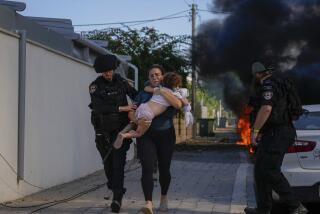Legal Victory Might Deter Future Acts
- Share via
WASHINGTON — Criminal prosecutions of terrorism, while rarely nabbing the masterminds, can at least distract and sometimes deter future attacks, experts said Tuesday.
Building a case against defendants such as those convicted of the bombings of two U.S. embassies in Africa--allegedly part of the network of Saudi dissident Osama bin Laden--typically takes years, and often faces major obstacles in evidence-gathering.
Nevertheless, by sending a message that perpetrators can eventually be brought to justice, such prosecutions “can work . . . and are one of several important tools that we have to use together against terrorism,” said Paul R. Pillar, a CIA official who is former deputy chief of the agency’s counter-terrorism unit.
Pillar said that though prosecutors may have difficulty in bringing a Bin Laden to trial, “everyone you take out of business is valuable,” especially since even lesser terrorists have often committed a number of criminal acts.
The threat of U.S. prosecution is “at the least a distraction” if not a deterrent, said Pillar, who is the author of a new book, “Terrorism and U.S. Foreign Policy.” It is also “a demonstration of U.S. seriousness in going after terrorism.”
It builds pressure on other countries who might ignore alleged wrongdoing to bring criminal cases against suspects. And it signals that the United States may also prosecute if it believes other countries have not been vigorous in their efforts. On several occasions, U.S. authorities have launched prosecutions when they believed that other countries have let defendants off too easy, he said.
As slow and ineffective as it can seem, the prosecutorial approach sends the right signal around the world because it “really does promote our values,” said Frank Ciffullo, director of the Terrorism Task Force at the Center for Strategic and International Studies, a Washington think tank.
The embassy bombing case may be long remembered in the annals of such prosecutions. It is the largest overseas prosecution brought by the federal government, officials said, describing it as the first stage in a continuing prosecutorial assault on Bin Laden’s far-flung network.
Twenty-two other defendants have been indicted in the bombings in Kenya and Tanzania, which killed 224 people. Among those, six are in custody and 13 remain at large, including Bin Laden himself and two top lieutenants.
Terrorism experts say that all the weapons against terrorism have some drawbacks, which is one reason that senior U.S. policymakers have usually had vigorous behind-the-scenes debates about which to use after terrorist attacks.
In recent years, prosecutors have gone after such figures as Ramsey Yusuf, who helped lead the World Trade Center bombing, and plotted to blow up U.S. airliners overseas; Sheik Omar Abdel Rahman, the blind Egyptian cleric who plotted a terrorist campaign in the United States; Mir Aimal Kansi, who killed two Americans just outside CIA headquarters in 1993; Tsutomo Shirosak, a Japanese Red Army member who tried to bomb a U.S. embassy in Jakarta, Indonesia, in 1986; and Omar Mohammed Ali Rezaq, whose 1985 hijacking of an Egypt Air flight led to the deaths of 60.
In 1986, after Americans died in the terrorist attack in Italy on the cruise ship Achille Lauro, Congress gave prosecutors a new tool for such prosecutions. It enacted a law that for the first time established legal jurisdiction over crimes involving violent attacks by terrorists on any U.S. national living abroad.
The law had previously covered only murder and assault against high-ranking U.S. officials.
Federal authorities have used the law to launch criminal investigations in connection with the deadly terrorist bombing of the U.S. destroyer Cole in Aden, Yemen, in October; and the bombing of a U.S. Air Force barracks in Dhahran, Saudi Arabia, in 1996.
The investigation of those cases illustrates the difficulties of such work. In both cases, U.S. officials have complained that local authorities impeded their access to evidence.
And in the case of the barracks bombing, the outcome remains uncertain after five years of work.
The embassy bombing convictions, like other successful prosecutions, are “a wonderful victory for the rule of law,” said Victoria Toensing, who was deputy assistant attorney general for terrorism in the Reagan administration. Yet, “you must remember that there are other ways to address terrorism too.”
More to Read
Sign up for Essential California
The most important California stories and recommendations in your inbox every morning.
You may occasionally receive promotional content from the Los Angeles Times.














